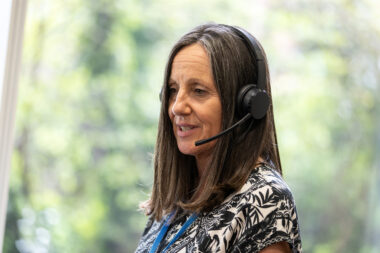Muscles. We use them to move. Walk, eat, smile, cry. Pump blood around our bodies. To breathe in and out. Our muscles matter.
We’re the leading charity for over 60 muscle wasting and weakening conditions. Connecting more than 110,000 people affected, and those around us.
We share expert advice and support people to live well now; we fund groundbreaking research to understand the different conditions better and to lead us to new treatments; we work with the NHS towards universal access to specialist healthcare and together, we campaign for people’s rights, better understanding, accessibility, and access to treatments.
What is muscular dystrophy?
The muscular dystrophies are a group of rare conditions that gradually cause muscles to weaken and waste. Sometimes you may see or hear them being talked about as neuromuscular conditions, or as a muscle wasting and weakening condition. They are usually inherited and are caused by changes (mutations) in the genes which are responsible for the structure and function of our muscles.
Muscular dystrophies are progressive conditions. This means they will worsen over time. Currently, there is no cure for muscular dystrophy. However, advances are being made in research to find effective treatments. We have invested more than £55 million into research and made advances that would have been unthinkable just ten years ago.
Symptoms of muscular dystrophy
The symptoms of muscular dystrophy, and the age at which symptoms occur will be different in each person. Common symptoms could include:
- Muscle weakness
- Muscle stiffness or pain
- Changes in mobility, such as difficulty walking
- Difficulty in lifting things
- Increased occurrence of falls
Some types of muscular dystrophy can affect the heart or the muscles used for breathing. In some severe cases, muscular dystrophy may have life-threatening complications.
Muscular dystrophy conditions are often difficult to diagnose from symptoms alone and a referral will be needed to a specialist for further testing.
Treatment for muscular dystrophy
Once a diagnosis has been made, it is common to have a range of healthcare professionals involved in your care to provide support.
Condition management is important for anyone with muscular dystrophy. Medication, physiotherapy, and adapted aids or equipment can support with symptom management and help to improve quality of life.

